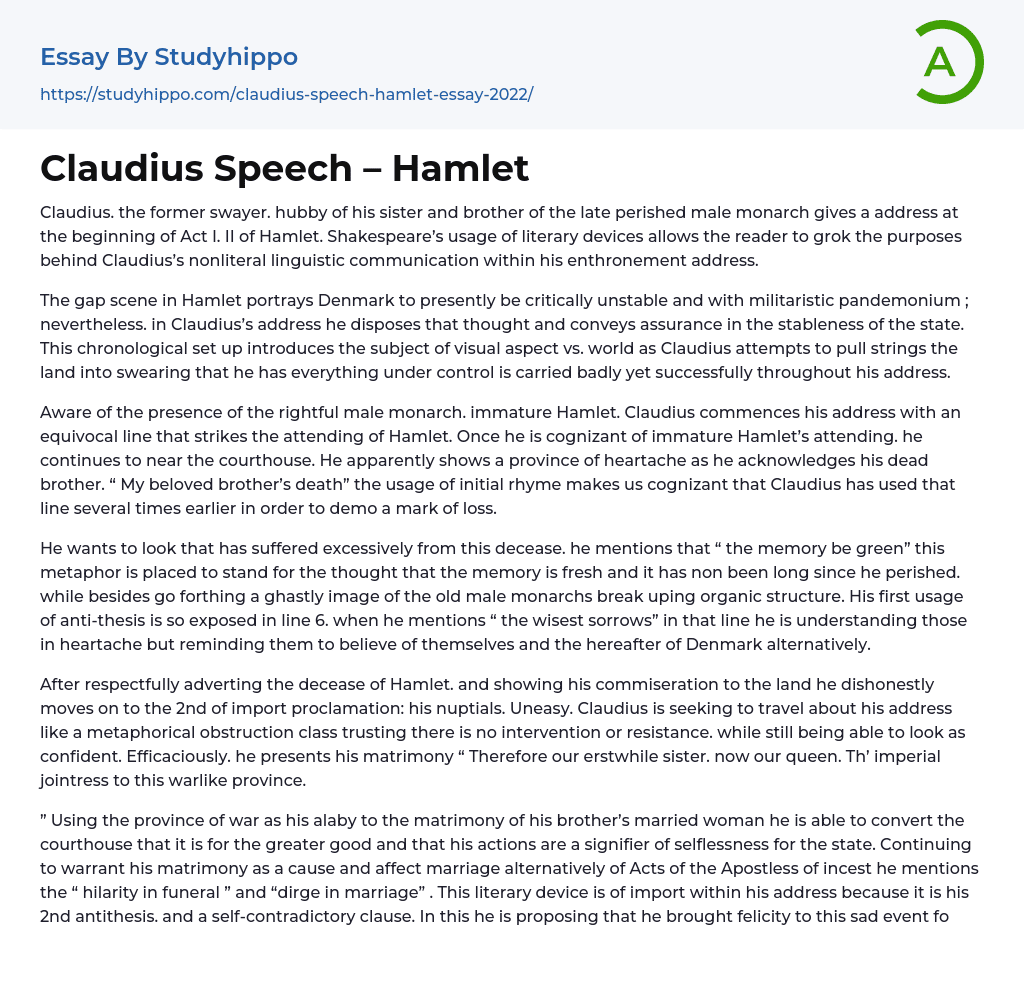In Act I, Scene II of Hamlet, Claudius, the former ruler, who is married to his sister and is the late monarch's brother, delivers a speech. Shakespeare's use of literary devices allows readers to understand the intentions behind Claudius's figurative language in his coronation speech. The opening scene of Hamlet depicts Denmark as currently unstable and in military chaos. However, in his speech, Claudius dismisses this idea and conveys confidence in the stability of the country. This chronological order introduces the theme of appearance vs reality as Claudius manipulates the land into believing that he has everything under control. He acknowledges the presence of Hamlet, the rightful king, in his speech and begins with a vague line that catches Hamlet's attention. Once he is aware of Hamlet's presence, he continues his approach
...to the courthouse. Claudius seemingly appears to be in a state of grief as he acknowledges his deceased brother with the line "My beloved brother's death." The use of initial rhyme shows that Claudius has used this line several times before to convey his sense of loss. He wants to appear as if he has suffered greatly from this death and mentions that "the memory be green," using a metaphor to represent the idea that the memory is fresh and it has not been long since he passed away.While lamenting the grotesque image of the old monarchs dismembering bodies, the speaker implements antithesis in line six with his mention of "the wisest sorrows." Here, he empathizes with those in grief, but urges them to consider their own future and that of Denmark. After respectfully acknowledging Hamlet's death and expressing condolences for the land,
the speaker moves unconvincingly to his second important announcement: his marriage. Nervously, Claudius attempts to hurdle his way through the speech like a metaphorical obstacle course, hoping for no interruption or resistance, while still appearing confident. He effectively presents his marriage as being for the betterment of the war-torn state, referring to his former sister-in-law as "Th' imperial jointress to this warlike state." By utilising this martial motif and focusing on his brother's widow’s suitability for leadership amidst conflict, he convinces the court that his actions are a form of selflessness for the good of the country. Continuing to justify his marriage as a cause-and-effect union rather than an act of incest, he mentions the "mirth in funeral" and "dirge in marriage". This literary device proves vital to his address as it serves as his second antithesis; a self-contradictory clause that implies he brought joy to a somber occasion for the benefit of his people. "In equal scale", he holds up both happiness and grief as essential to achieving a stable country.Claudius aims to create a sense of balance in his reign by mitigating both happiness and sadness. In order to compensate for his sorrow over his deceased brother, he decides to marry his sister. Although this is an unusual occurrence, Claudius projects confidence in his role as king and manages to quell any opposition. By using the phrase "we", Claudius demonstrates that he is speaking on behalf of everyone, and forces others to agree with him. He subtly displays his dominance over Denmark by threatening those who oppose him, without showing aggression. Claudius then moves onto the issue of Norway and confidently announces his
plan of action. Despite mentioning his late brother multiple times, he does not appear sentimental about the matter and instead focuses on assuring the courthouse that Denmark is not weak with regard to Fortibras.By presenting his future plans forward, Claudius successfully portrays himself as an adult male of action. Writing a letter to Norway about the uncle of young Fortibras convinces many that he is a powerful monarch who knows what he is doing, calming any concerns the country may have. To further assert his confidence, he appoints two couriers to deliver the letter, showcasing his trust in his officials - although ironically, this was also to prepare for potential treachery. Claudius's speech was a success as he concealed his inner insecurities and portrayed himself as a good leader. His word use was crucial in conveying awkward points like his unusual marriage to his sister, and his use of antithesis did make readers question his sincerity, but it did not affect the courthouse's opinion. Claudius displayed superiority over everyone in the courthouse, especially Hamlet, and made it known that he would not tolerate any dissent towards his rule. Overall, by presenting an action plan and proving himself as king, Claudius successfully solidified his position of power.
- Prince Hamlet essays
- Hamlet Madness essays
- A Doll's House essays
- A Midsummer Night's Dream essays
- A raisin in the sun essays
- A Streetcar Named Desire essays
- An Inspector Calls essays
- Death of a salesman essays
- Everyman essays
- Fences essays
- Hamlet essays
- Hedda Gabler essays
- Iago essays
- King Lear essays
- Macbeth essays
- Much ado about nothing essays
- Oedipus Rex essays
- Oedipus The King essays
- Othello essays
- Pygmalion essays
- Romeo And Juliet essays
- Tartuffe essays
- The glass menagerie essays
- The Importance of Being Earnest essays
- The Merchant Of Venice essays
- The Taming of The Shrew essays
- Twelfth Night essays
- Waiting For Godot essays
- Adoption essays
- Aunt essays
- Babies essays
- Bedroom essays
- Caring essays
- Children essays
- Daughter essays
- Divorce essays
- Dog essays
- Dysfunctional Family essays
- Family Tradition essays
- Family Values essays
- Father essays
- Foster Care essays
- Friends essays
- Grandparent essays
- Home essays
- Hometown essays
- Husband essays
- Jealousy essays
- Love essays
- Marriage essays




